We use cookies on this site to enhance your experience.
By selecting “Accept” and continuing to use this website, you consent to the use of cookies.
Search for academic programs, residence, tours and events and more.
 The overall focus of the Energy Metabolism Research Laboratory (EMRL) is the effect of exercise and nutrition in regulating energy balance which is the dynamic interplay between energy intake and energy expenditure. A key area of research investigates the potential mechanisms involved in appetite regulation and how exercise may modulate hunger and satiety signals. Through integrative approaches combining physiology, nutrition, and behavioral science, Dr. Hazell and his lab aim to deepen understanding of how exercise can be optimized to promote energy balance and are dedicated to advancing both scientific knowledge and practical strategies for improving health through physical activity.
The overall focus of the Energy Metabolism Research Laboratory (EMRL) is the effect of exercise and nutrition in regulating energy balance which is the dynamic interplay between energy intake and energy expenditure. A key area of research investigates the potential mechanisms involved in appetite regulation and how exercise may modulate hunger and satiety signals. Through integrative approaches combining physiology, nutrition, and behavioral science, Dr. Hazell and his lab aim to deepen understanding of how exercise can be optimized to promote energy balance and are dedicated to advancing both scientific knowledge and practical strategies for improving health through physical activity.
Appetite regulation involves the integration of the orexigenic (appetite stimulating) and anorexigenic (appetite inhibiting) hormones in the hypothalamus. While eating is known to influence these hormones, the long-term objective of my NSERC-funded research program is to understand how exercise affects these peripheral signals in humans. Using an integrative approach where exercise and nutrition are used to alter appetite regulation and study the effects of key peripheral appetite signals (i.e., acylated ghrelin, PYY, GLP-1), we are advancing understanding in the fields of energy intake regulation, metabolism, and nutrition.
It is important to explore and understand how exercise suppresses appetite. Improving our understanding appetite regulation is integral in the application of mechanistic research focused on how exercise can be structured to suppress appetite, and therefore improve body composition and overall health.
High-intensity interval training (HIIT) involves brief repeated bouts of near maximal exercise (80%–100% maximal heart rate interspersed with short recovery periods and has been shown to elicit comparable health and performance benefits to moderate-intensity (70% maximal oxygen consumption (VO2max)) continuous training, albeit with much less time-commitment and exercise volume. Similar benefits are achieved with a more intense form of intermittent exercise known as sprint interval training (SIT) that involves supramaximal (>100% VO2max) work bouts, traditionally structured as four to six 30-second “all-out” efforts separated by four minutes of recovery.
We are interested in the effects of both HIIT and SIT on energy expenditure, substrate oxidation, and its ability to promote fat loss in response to a training program. While exercise intensity appears beneficial to these physiological processes, a common criticism is that people will not participate in interval training on a regular basis despite its ability to improve health and fitness. To address this issue, we collaborate with Dr. Jennifer Roberston-Wilson and Dr. Mark Eys (both of the Department of Kinesiology and Physical Education at Laurier) to investigate the psychological responses to interval training.
MSc Student, 2025 to present
 Wynne completed her BScwith a major in biochemistry at Queen’s University. Wynne has now joined the EMRL as a first-year Master's student. Before joining the team at Laurier, she previously volunteered in the EMRL during the summer prior, helping with their study comparing different exercise frequencies. She was particularly interested in their work investigating the effects of high-intensity interval training on appetite hormones. After volunteering in the lab at Laurier, it inspired her to pursue her masters in Kinesiology. Outside of academics, she was also a competitive gymnast and was part of the Queen’s Cheerleading team. Her participation in sports has fueled her motivation to pursue research in exercise physiology, and she is excited to begin her own research project at Laurier.
Wynne completed her BScwith a major in biochemistry at Queen’s University. Wynne has now joined the EMRL as a first-year Master's student. Before joining the team at Laurier, she previously volunteered in the EMRL during the summer prior, helping with their study comparing different exercise frequencies. She was particularly interested in their work investigating the effects of high-intensity interval training on appetite hormones. After volunteering in the lab at Laurier, it inspired her to pursue her masters in Kinesiology. Outside of academics, she was also a competitive gymnast and was part of the Queen’s Cheerleading team. Her participation in sports has fueled her motivation to pursue research in exercise physiology, and she is excited to begin her own research project at Laurier.
MSc Student, 2024 to present
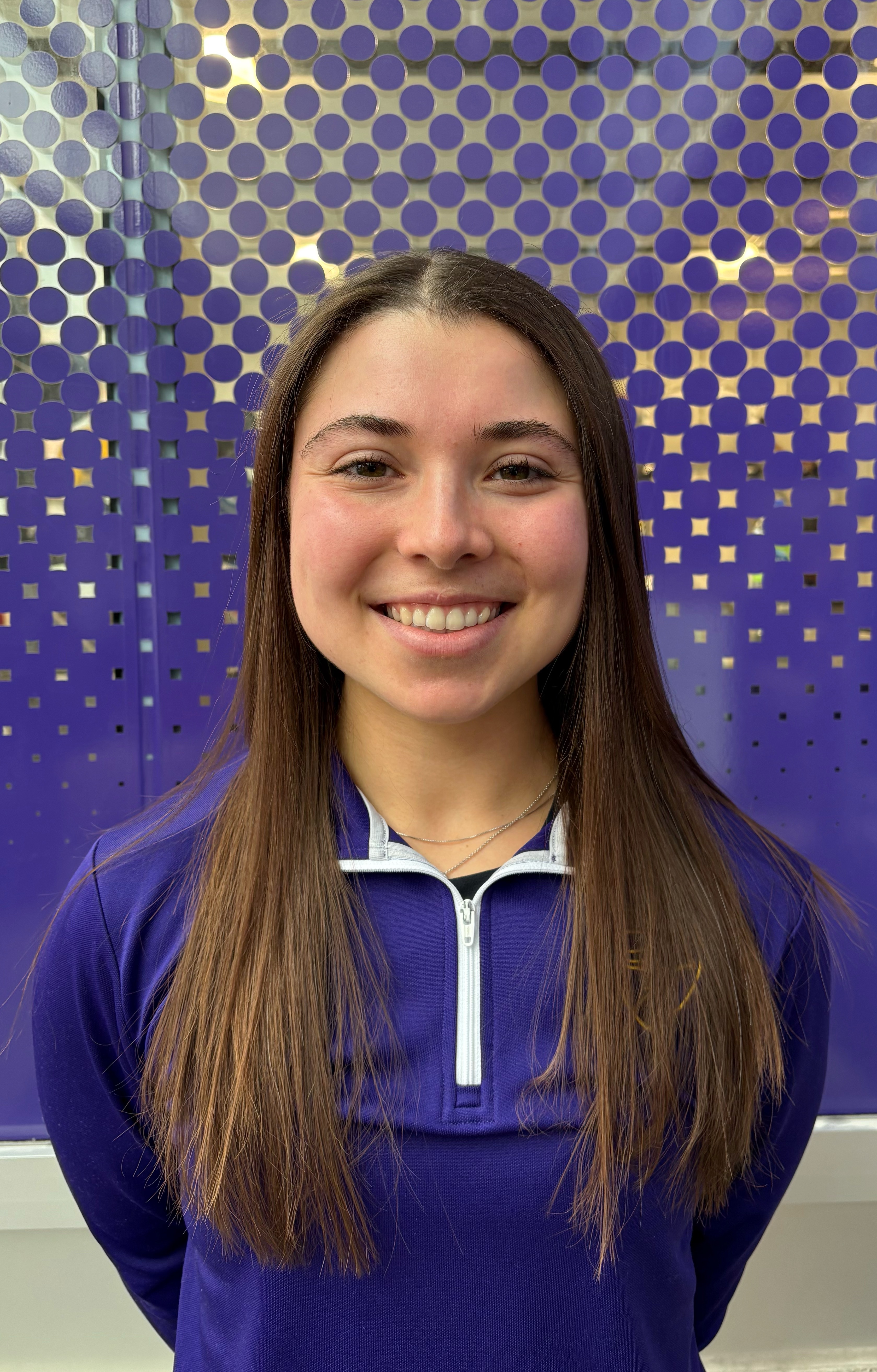 Maddy completing her Master’s while also working as a Strength and Conditioning Graduate Assistant Coach at Wilfrid Laurier University. After completing her BKin at Laurier and interning during her 4th-year term with Laurier's Strength and Conditioning program, she was excited to pursue her MSc with a focus on strength and conditioning. Her research focuses on Laurier’s women’s varsity ice hockey team, quantifying training load and informing training periodization strategies throughout the season. Maddy is particularly interested in acute load management surrounding the Ontario University Athletics exam break. Apart of spending a lot of time in the weight room, Maddy enjoys outdoor activities, playing sports, animals, and cooking.
Maddy completing her Master’s while also working as a Strength and Conditioning Graduate Assistant Coach at Wilfrid Laurier University. After completing her BKin at Laurier and interning during her 4th-year term with Laurier's Strength and Conditioning program, she was excited to pursue her MSc with a focus on strength and conditioning. Her research focuses on Laurier’s women’s varsity ice hockey team, quantifying training load and informing training periodization strategies throughout the season. Maddy is particularly interested in acute load management surrounding the Ontario University Athletics exam break. Apart of spending a lot of time in the weight room, Maddy enjoys outdoor activities, playing sports, animals, and cooking.
MSc Student, 2024 to present
 David completed his Bachelor of Kinesiology at Wilfrid Laurier University where he had the opportunity to complete an undergraduate thesis in the EMRL in his final year. David is continuing his studies in the EMRL where he is currently in his second year of his MSc which is supported by an NSERC scholarship. His thesis is based around how ‘exercise snacks’, which consist of performing ‘bite-sized’ amounts of vigorous exercise throughout the day, influence the components of energy balance (intake and expenditure). The results of this study may give insight into feasible exercise strategies to incorporate into daily routines that can aid in body weight regulation. David enjoys being physically active and spending time with friends and family.
David completed his Bachelor of Kinesiology at Wilfrid Laurier University where he had the opportunity to complete an undergraduate thesis in the EMRL in his final year. David is continuing his studies in the EMRL where he is currently in his second year of his MSc which is supported by an NSERC scholarship. His thesis is based around how ‘exercise snacks’, which consist of performing ‘bite-sized’ amounts of vigorous exercise throughout the day, influence the components of energy balance (intake and expenditure). The results of this study may give insight into feasible exercise strategies to incorporate into daily routines that can aid in body weight regulation. David enjoys being physically active and spending time with friends and family.
MSc Student, 2025 to present
 Alexa completed her Honours Bachelor of Kinesiology at Laurier in 2025 and is now pursuing her Master’s degree in the EMRL. During her undergraduate studies, she became interested in the lab’s work and was eager to continue exploring these topics at the graduate level. Growing up playing basketball sparked her curiosity about how exercise influences appetite, energy balance, and substrate use, as well as how the menstrual cycle may play a role in these processes. Alexa also enjoys staying active through a variety of sports and spending time outdoors.
Alexa completed her Honours Bachelor of Kinesiology at Laurier in 2025 and is now pursuing her Master’s degree in the EMRL. During her undergraduate studies, she became interested in the lab’s work and was eager to continue exploring these topics at the graduate level. Growing up playing basketball sparked her curiosity about how exercise influences appetite, energy balance, and substrate use, as well as how the menstrual cycle may play a role in these processes. Alexa also enjoys staying active through a variety of sports and spending time outdoors.
MSc Student, 2024 to present
 Siv completed her BSc in Honours Science with a minor in Biology at the University of Waterloo in 2024. She joined the Exercise Metabolism Research Lab later that year as a Master’s student, where her research explores how different phases of the menstrual cycle may influence the way the body responds to exercise, particularly in terms of energy balance. Her work reflects her broader interests in exercise physiology, nutrition, and metabolic health. Apart from grad school, Sivamrutha enjoys playing softball, hiking, and longboarding.
Siv completed her BSc in Honours Science with a minor in Biology at the University of Waterloo in 2024. She joined the Exercise Metabolism Research Lab later that year as a Master’s student, where her research explores how different phases of the menstrual cycle may influence the way the body responds to exercise, particularly in terms of energy balance. Her work reflects her broader interests in exercise physiology, nutrition, and metabolic health. Apart from grad school, Sivamrutha enjoys playing softball, hiking, and longboarding.
PhD Candidate, 2023 to present
 Jessie completed her undergraduate degree in kinesiology with a specialization in human nutrition atthe University of Waterloo in 2020. She went on to complete a Masters degree at Laurier, focusing on the influence of ovarian hormones on appetite regulation in pre- and post-menopausal females, while also working in multiple strength & conditioning facilities. Jessie returned to Laurier in 2023 to pursue her doctorate where she continues to investigate how ovarian hormones influence appetite, energy balance, and metabolism. Jessie is currently supported by an NSERC-PGSD award, and outside of the lab enjoys endurance events that involve running, swimming and biking.
Jessie completed her undergraduate degree in kinesiology with a specialization in human nutrition atthe University of Waterloo in 2020. She went on to complete a Masters degree at Laurier, focusing on the influence of ovarian hormones on appetite regulation in pre- and post-menopausal females, while also working in multiple strength & conditioning facilities. Jessie returned to Laurier in 2023 to pursue her doctorate where she continues to investigate how ovarian hormones influence appetite, energy balance, and metabolism. Jessie is currently supported by an NSERC-PGSD award, and outside of the lab enjoys endurance events that involve running, swimming and biking.
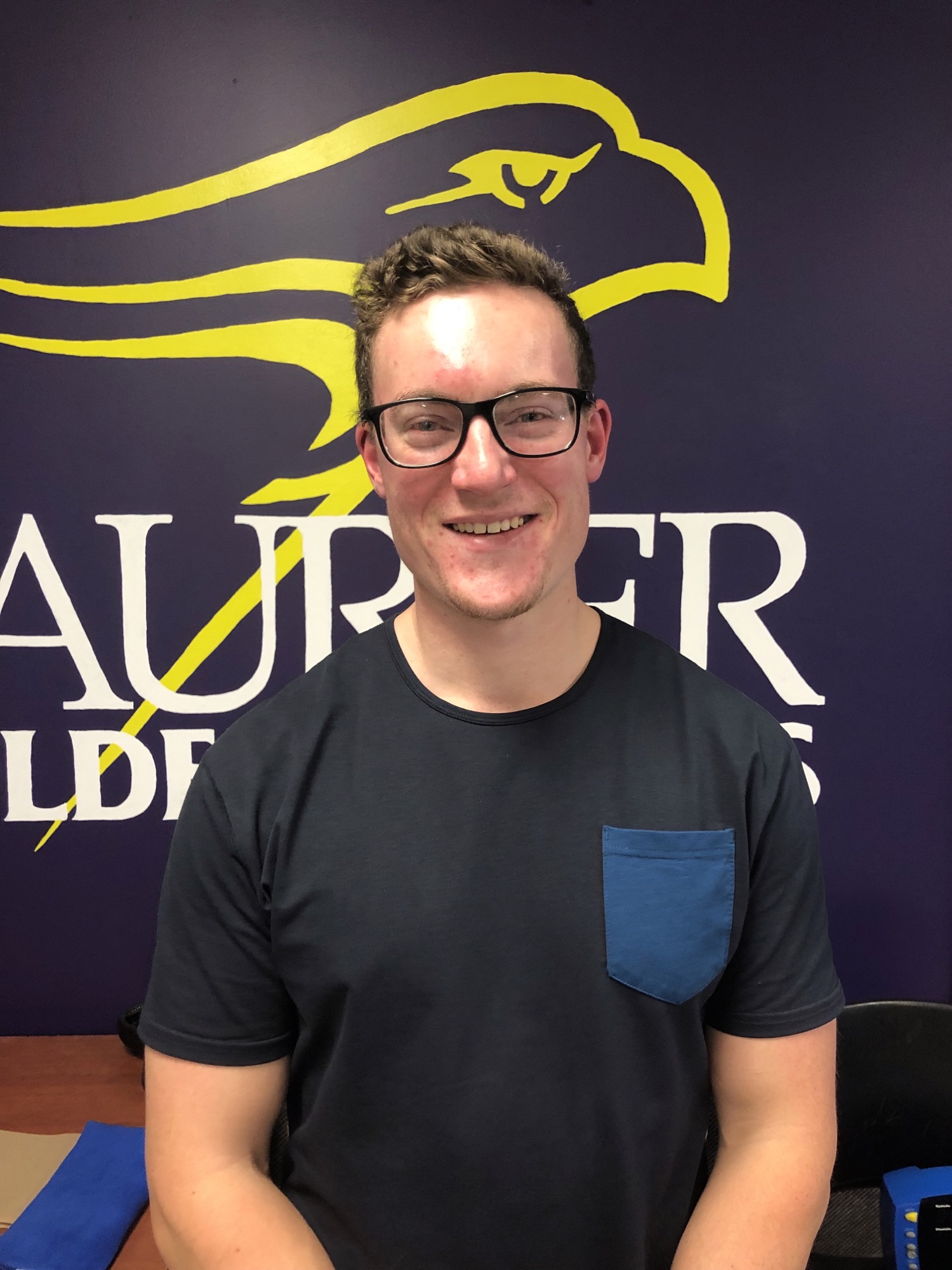 Derek completed his undergraduate and Master’s at the University of Windsor. His Master’s advisor was actually the same as Dr. Hazell’s. Derek came to Laurier in 2019 interested in the role of blood glucose and insulin in appetite regulation is conducting studies to determine if fluctuations in glucose and insulin mediate appetite post-exercise. He was supported by consecutive Ontario Graduate Scholarships (OGS), completed his PhD in 2024, and now works as Medical Lead. Outside of the lab, you cand find Derek playing hockey, golf, snowboarding or being a Leaf and Blue Jays fan and all the frustrations that come along with that.
Derek completed his undergraduate and Master’s at the University of Windsor. His Master’s advisor was actually the same as Dr. Hazell’s. Derek came to Laurier in 2019 interested in the role of blood glucose and insulin in appetite regulation is conducting studies to determine if fluctuations in glucose and insulin mediate appetite post-exercise. He was supported by consecutive Ontario Graduate Scholarships (OGS), completed his PhD in 2024, and now works as Medical Lead. Outside of the lab, you cand find Derek playing hockey, golf, snowboarding or being a Leaf and Blue Jays fan and all the frustrations that come along with that.
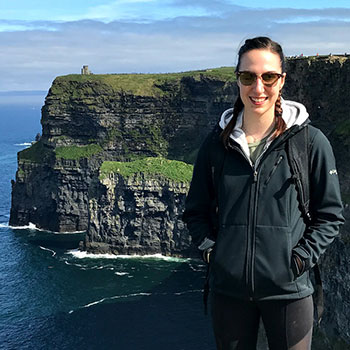 Abbey completed her BA in Kinesiology at Laurier in 2018. She undertook a fourth-year undergraduate thesis project in the EMRL studying the effects of fasting and feeding on post-exercise metabolism. Abbey then completed her Master’s in the EMRL where her project focussed on the impact of high-intensity classroom activity breaks. Her research in primary school students demonstrated a 4 min classroom activity break improved student’s on-task behaviour and physical activity levels, meaning the students were more focussed during classroom activities and accumulated more activity! Abbey was supported by an Ontario Graduate Scholarship and an NSERC Canada Graduate Scholarship during her Masters. She is now a 2nd year Bachelor of Education student at Laurier.
Abbey completed her BA in Kinesiology at Laurier in 2018. She undertook a fourth-year undergraduate thesis project in the EMRL studying the effects of fasting and feeding on post-exercise metabolism. Abbey then completed her Master’s in the EMRL where her project focussed on the impact of high-intensity classroom activity breaks. Her research in primary school students demonstrated a 4 min classroom activity break improved student’s on-task behaviour and physical activity levels, meaning the students were more focussed during classroom activities and accumulated more activity! Abbey was supported by an Ontario Graduate Scholarship and an NSERC Canada Graduate Scholarship during her Masters. She is now a 2nd year Bachelor of Education student at Laurier.
 Lauren completed her BSc in Nutritional and Nutraceutical Sciences at the University of Guelph in 2019. She joined the EMRL later that year and her work initially aimed to evaluate the efficacy of sprint interval training frequency (3 vs 4 vs 5 times per week) in healthy recreationally-active adults on cardiorespiratory. However, the COVID-19 pandemic significantly delayed and slowed data collection and Lauren was forced to pivot. Her eventual project focused on the potential crossover effect of running or cycling sprint interval training on cardiorespiratory fitness. Her results demonstrated running training may generate greater crossover effects than cycling, though cycling and running protocols induced similar improvements when tested in the same mode.
Lauren completed her BSc in Nutritional and Nutraceutical Sciences at the University of Guelph in 2019. She joined the EMRL later that year and her work initially aimed to evaluate the efficacy of sprint interval training frequency (3 vs 4 vs 5 times per week) in healthy recreationally-active adults on cardiorespiratory. However, the COVID-19 pandemic significantly delayed and slowed data collection and Lauren was forced to pivot. Her eventual project focused on the potential crossover effect of running or cycling sprint interval training on cardiorespiratory fitness. Her results demonstrated running training may generate greater crossover effects than cycling, though cycling and running protocols induced similar improvements when tested in the same mode.
 Dan completed his BA in Kinesiology at Laurier in 2017. Dan joined the EMRL in 2018 and expanded the EMRL’s focus onto resistance exercise. While traditional resistance training involves heavy loads completed at a relatively low repetition range (3-10), Dan’s Master’s thesis focused on the effect of low-load (30% of 1-repetition maximum) high-volume resistance training on energy balance. Though delayed due to COVID-19, his results demonstrate low-load high-repetition resistance training session elevates post-exercise metabolism and blood lactate while decreasing subjective appetite compared to high-load low-repetition training suggesting more positive benefits to energy balance. Dan is now a Lab Instructor in the Department of Kinesiology and Physical Education at Laurier.
Dan completed his BA in Kinesiology at Laurier in 2017. Dan joined the EMRL in 2018 and expanded the EMRL’s focus onto resistance exercise. While traditional resistance training involves heavy loads completed at a relatively low repetition range (3-10), Dan’s Master’s thesis focused on the effect of low-load (30% of 1-repetition maximum) high-volume resistance training on energy balance. Though delayed due to COVID-19, his results demonstrate low-load high-repetition resistance training session elevates post-exercise metabolism and blood lactate while decreasing subjective appetite compared to high-load low-repetition training suggesting more positive benefits to energy balance. Dan is now a Lab Instructor in the Department of Kinesiology and Physical Education at Laurier.
 Greg completed his BA in Sport, Health and Physical Education with a minor in Psychology at Vancouver Island University. Greg joined the EMRL in 2016 and focused on the effectiveness and adherence of performing running sprint interval training and moderate-intensity continuous training protocols in a real-world setting. A very difficult study to run, low adherence hampered his overall results, but generally they suggest that both moderate-intensity and sprint interval training are effective when performed consistently as exercise adherence and change in cardiorespiratory fitness were positively correlated. We are looking to continue this work post-COVID. During his time in the EMRL, Greg also worked as a strength and conditioning intern with Laurier Athletics where he helped organize sessions and coach athletes to improve their conditioning and sports performance. Greg is now a Strength & Conditioning Coach at Red Deer College in Alberta.
Greg completed his BA in Sport, Health and Physical Education with a minor in Psychology at Vancouver Island University. Greg joined the EMRL in 2016 and focused on the effectiveness and adherence of performing running sprint interval training and moderate-intensity continuous training protocols in a real-world setting. A very difficult study to run, low adherence hampered his overall results, but generally they suggest that both moderate-intensity and sprint interval training are effective when performed consistently as exercise adherence and change in cardiorespiratory fitness were positively correlated. We are looking to continue this work post-COVID. During his time in the EMRL, Greg also worked as a strength and conditioning intern with Laurier Athletics where he helped organize sessions and coach athletes to improve their conditioning and sports performance. Greg is now a Strength & Conditioning Coach at Red Deer College in Alberta.
 Hashim completed his BSc in Exercise Science at the University of Lethbridge. He joined the EMRL in 2014 after having completed an undergraduate project with Dr. Hazell at Lethbridge and moving to Ontario to attend Laurier. His Master’s thesis research examined the effect of exercise on appetite-regulating hormones, focusing specifically on the mechanisms that alter the release of these hormones in response to various intensities of exercise. Hashim’s data implicated both lactate and interleukin-6 as important potential mediators of exercise-induced appetite suppression. After completing his Master’s Hashim completed his NSERC-funded PhD in muscle physiology at Queen’s University with Dr. Brendon Gurd and his NSERC-funded Post-Doctoral Fellow at the University of British Columbia Okanagan working with Dr. Jonathan Little. Hashim is now an Assistant Professor at UBC Okanagan.
Hashim completed his BSc in Exercise Science at the University of Lethbridge. He joined the EMRL in 2014 after having completed an undergraduate project with Dr. Hazell at Lethbridge and moving to Ontario to attend Laurier. His Master’s thesis research examined the effect of exercise on appetite-regulating hormones, focusing specifically on the mechanisms that alter the release of these hormones in response to various intensities of exercise. Hashim’s data implicated both lactate and interleukin-6 as important potential mediators of exercise-induced appetite suppression. After completing his Master’s Hashim completed his NSERC-funded PhD in muscle physiology at Queen’s University with Dr. Brendon Gurd and his NSERC-funded Post-Doctoral Fellow at the University of British Columbia Okanagan working with Dr. Jonathan Little. Hashim is now an Assistant Professor at UBC Okanagan.
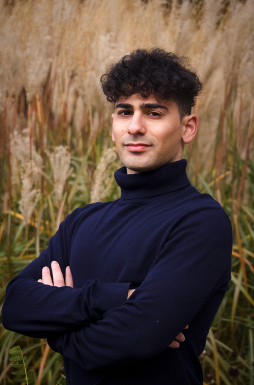 Ryan completed his BSc in Biomedical Sciences at the University of Guelph in 2022. His Master’s thesis investigated the impact of exercise intensity and duration on during and post-exercise V̇O2, as well as post-exercise fat oxidation. His results suggest that while 30 min of continuous moderate-intensity exercise expends energy during exercise with very little post-exercise, modifying a low-volume HIIT protocol (10 x 1 min efforts at 90% maximum heart rate interspersed with 1 min recovery) by adding five additional intervals resulted in a greater overall session VO2 than a 30 min MICT session.
Ryan completed his BSc in Biomedical Sciences at the University of Guelph in 2022. His Master’s thesis investigated the impact of exercise intensity and duration on during and post-exercise V̇O2, as well as post-exercise fat oxidation. His results suggest that while 30 min of continuous moderate-intensity exercise expends energy during exercise with very little post-exercise, modifying a low-volume HIIT protocol (10 x 1 min efforts at 90% maximum heart rate interspersed with 1 min recovery) by adding five additional intervals resulted in a greater overall session VO2 than a 30 min MICT session.
 Claudia completed her BA in Kinesiology at Laurier in 2018 before joining the EMRL in 2019. Her Master’s thesis, co-supervised by Dr. Jennifer Robertson-Wilson and in collaboration with Dr. Mark Eys, compare psychological responses to, preference for, and adherence to moderate-intensity continuous training, high-intensity interval training (bouts near maximal effort), and modified sprint-interval training (all-out efforts) among adults aged 30-50 years. Though also delayed due to the COVID-19 pandemic, preliminary results suggest a single session of moderate-intensity continuous training or high-intensity interval training is more enjoyable and preferred compared to modified-sprint interval training protocol. We are currently collecting additional participants to enhance our sample size.
Claudia completed her BA in Kinesiology at Laurier in 2018 before joining the EMRL in 2019. Her Master’s thesis, co-supervised by Dr. Jennifer Robertson-Wilson and in collaboration with Dr. Mark Eys, compare psychological responses to, preference for, and adherence to moderate-intensity continuous training, high-intensity interval training (bouts near maximal effort), and modified sprint-interval training (all-out efforts) among adults aged 30-50 years. Though also delayed due to the COVID-19 pandemic, preliminary results suggest a single session of moderate-intensity continuous training or high-intensity interval training is more enjoyable and preferred compared to modified-sprint interval training protocol. We are currently collecting additional participants to enhance our sample size.
 Seth completed his Bachelor’s of Human Kinetics at the University of Windsor before joining the EMRL. Seth’s Master’s was conducted in the EMRL examined the effects of different exercise intensities on post-exercise hypertension, in collaboration with Dr. Kenji Kenno from the University of Windsor. Seth decided to stay in the EMRL to pursue his Doctorate where he is now NSERC-funded working on the role of lactate as a mediator of exercise-induced appetite suppression. Seth completed his PhD in 2024 and is now a Banting Post-Doctoral Fellow at the University of British Columbia Okanagan working with Dr. Jonathan Little and Dr. Hashim Islam. Outside of the lab, Seth likes to enjoy the outdoors, exercise, and watch sports.
Seth completed his Bachelor’s of Human Kinetics at the University of Windsor before joining the EMRL. Seth’s Master’s was conducted in the EMRL examined the effects of different exercise intensities on post-exercise hypertension, in collaboration with Dr. Kenji Kenno from the University of Windsor. Seth decided to stay in the EMRL to pursue his Doctorate where he is now NSERC-funded working on the role of lactate as a mediator of exercise-induced appetite suppression. Seth completed his PhD in 2024 and is now a Banting Post-Doctoral Fellow at the University of British Columbia Okanagan working with Dr. Jonathan Little and Dr. Hashim Islam. Outside of the lab, Seth likes to enjoy the outdoors, exercise, and watch sports.
 Greg completed his BA in Kinesiology at Laurier in 2016. He undertook a fourth-year undergraduate thesis project in the EMRL focused on the aerobic and anaerobic effects of manipulating the work-to-rest ratios of sprint interval training. His Master’s research IL-6 plays a role in the appetite-inhibitory effects of moderate-intensity continuous exercise in humans by utilizing an obese human model. His results suggest little difference in the appetite-regulatory and perceptual response to exercise between lean and sedentary males with obesity. These results call into question the potential role of IL-6 in appetite regulation. Greg was supported by an Ontario Graduate Scholarship during his Master’s and is now an NSERC-funded PhD Candidate at the University of Guelph working with Dr. David Wright.
Greg completed his BA in Kinesiology at Laurier in 2016. He undertook a fourth-year undergraduate thesis project in the EMRL focused on the aerobic and anaerobic effects of manipulating the work-to-rest ratios of sprint interval training. His Master’s research IL-6 plays a role in the appetite-inhibitory effects of moderate-intensity continuous exercise in humans by utilizing an obese human model. His results suggest little difference in the appetite-regulatory and perceptual response to exercise between lean and sedentary males with obesity. These results call into question the potential role of IL-6 in appetite regulation. Greg was supported by an Ontario Graduate Scholarship during his Master’s and is now an NSERC-funded PhD Candidate at the University of Guelph working with Dr. David Wright.
 Sara completed her BA in Kinesiology at Laurier in 2017. Her Master’s thesis research utilized vigorous-intensity continuous training as a method to modulate plasma concentrations of the ovarian hormones estrogen and progesterone to examine their involvement in appetite regulation across the menstrual cycle. Her results suggest the typical post-exercise suppression of acylated ghrelin may be blunted in the presence of elevated ovarian hormones in the luteal phase, though sex hormones do not appear to play a role in the anorexigenic hormone response to acute exercise. Sara was supported by a NSERC Canada Graduate Scholarship and an Ontario Graduate Scholarships during her Master’s.
Sara completed her BA in Kinesiology at Laurier in 2017. Her Master’s thesis research utilized vigorous-intensity continuous training as a method to modulate plasma concentrations of the ovarian hormones estrogen and progesterone to examine their involvement in appetite regulation across the menstrual cycle. Her results suggest the typical post-exercise suppression of acylated ghrelin may be blunted in the presence of elevated ovarian hormones in the luteal phase, though sex hormones do not appear to play a role in the anorexigenic hormone response to acute exercise. Sara was supported by a NSERC Canada Graduate Scholarship and an Ontario Graduate Scholarships during her Master’s.
 Kyle completed his BA in Kinesiology at Laurier in 2016. His Master’s thesis research compared the incidence of response between a traditional sprint interval training protocol (4–6 x 30 s all out with 240 s recovery) and 2 modified sprint interval training protocols (8–12 x 15 s all-out efforts with 120 s recovery and 24–36 x 5 s all out efforts with 40 s recovery) over 4 weeks of training in 84 recreationally active individuals. His results demonstrated that the incidence of response was similar across all training groups when evaluating aerobic capacity (which arguably has the greatest health implications), validating the use of a modified 15:120 and 5:40 sprint interval training protocols to improve cardiorespiratory fitness. This work was done in collaboration with Dr. Brendon Gurd at Queen’s University and his PhD student Jacob Bonafiglia.
Kyle completed his BA in Kinesiology at Laurier in 2016. His Master’s thesis research compared the incidence of response between a traditional sprint interval training protocol (4–6 x 30 s all out with 240 s recovery) and 2 modified sprint interval training protocols (8–12 x 15 s all-out efforts with 120 s recovery and 24–36 x 5 s all out efforts with 40 s recovery) over 4 weeks of training in 84 recreationally active individuals. His results demonstrated that the incidence of response was similar across all training groups when evaluating aerobic capacity (which arguably has the greatest health implications), validating the use of a modified 15:120 and 5:40 sprint interval training protocols to improve cardiorespiratory fitness. This work was done in collaboration with Dr. Brendon Gurd at Queen’s University and his PhD student Jacob Bonafiglia.
 Logan completed his BA in Kinesiology at the University of Lethbridge. He started in the lab as an undergraduate student at Lethbridge before re-locating to Laurier to begin his Masters. Logan’s Master's research examined whether appetite regulation is altered across the menstrual cycle or with oral contraceptives. His results suggest that subtle differences exist between appetite-regulating hormones and perceived appetite throughout the menstrual cycle and with oral contraceptive use. Logan was funded by an Ontario Graduate Scholarship while in the EMRL. After completing his Master's degree, Logan completed an NSERC-funded PhD at the University of Guelph with Dr. David Wright and is now a CIHR-funded Post-Doctoral Fellow at McMaster University working with Dr. Gregory Steinberg.
Logan completed his BA in Kinesiology at the University of Lethbridge. He started in the lab as an undergraduate student at Lethbridge before re-locating to Laurier to begin his Masters. Logan’s Master's research examined whether appetite regulation is altered across the menstrual cycle or with oral contraceptives. His results suggest that subtle differences exist between appetite-regulating hormones and perceived appetite throughout the menstrual cycle and with oral contraceptive use. Logan was funded by an Ontario Graduate Scholarship while in the EMRL. After completing his Master's degree, Logan completed an NSERC-funded PhD at the University of Guelph with Dr. David Wright and is now a CIHR-funded Post-Doctoral Fellow at McMaster University working with Dr. Gregory Steinberg.
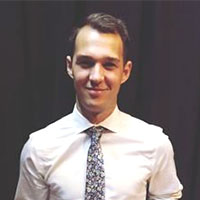 Luke completed his Bachelor’s of Kinesiology at McMaster University in 2016. He joined the lab later that year and his Master’s research examined the role of lactate on appetite using sodium bicarbonate supplementation alter blood lactate concentrations during high-intensity exercise. His results further implicate lactate as a mediator of exercise-induced appetite suppression, given exercise-induced increases in lactate during the sodium bicarbonate session altered peripheral concentrations of appetite-regulating hormones, culminating in a reduction of appetite. During his time in the EMRL, Luke also worked as a strength and conditioning intern with Laurier Athletics where he helped organize sessions and coach athletes to improve their conditioning and sports performance. He is now an Strength & Conditioning Coach (Apprenticeship) at the Canadian Sport Institute Ontario.
Luke completed his Bachelor’s of Kinesiology at McMaster University in 2016. He joined the lab later that year and his Master’s research examined the role of lactate on appetite using sodium bicarbonate supplementation alter blood lactate concentrations during high-intensity exercise. His results further implicate lactate as a mediator of exercise-induced appetite suppression, given exercise-induced increases in lactate during the sodium bicarbonate session altered peripheral concentrations of appetite-regulating hormones, culminating in a reduction of appetite. During his time in the EMRL, Luke also worked as a strength and conditioning intern with Laurier Athletics where he helped organize sessions and coach athletes to improve their conditioning and sports performance. He is now an Strength & Conditioning Coach (Apprenticeship) at the Canadian Sport Institute Ontario.
Funding for EMRL is provided by Laurier, the Natural Sciences and Engineering Research Council of Canada (NSERC) and the Canada Foundation for Innovation.


Tom Hazell
E: thazell@wlu.ca
T: 519.884.1970 x3048
Office Location:
Northdale Science Research Centre, Waterloo